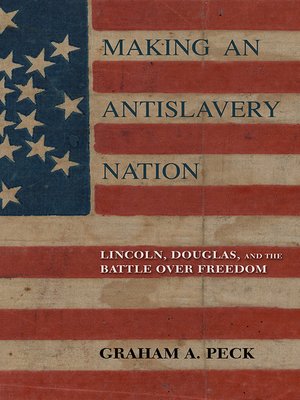Making an Antislavery Nation
ebook ∣ Lincoln, Douglas, and the Battle over Freedom
By Graham A. Peck

Sign up to save your library
With an OverDrive account, you can save your favorite libraries for at-a-glance information about availability. Find out more about OverDrive accounts.
Find this title in Libby, the library reading app by OverDrive.



Search for a digital library with this title
Title found at these libraries:
| Library Name | Distance |
|---|---|
| Loading... |
This sweeping narrative presents an original and compelling explanation for the triumph of the antislavery movement in the United States prior to the Civil War. Abraham Lincoln's election as the first antislavery president was hardly preordained. From the country's inception, Americans had struggled to define slavery's relationship to freedom. Most Northerners supported abolition in the North but condoned slavery in the South, while most Southerners denounced abolition and asserted slavery's compatibility with whites' freedom. On this massive political fault line hinged the fate of the nation.
Graham A. Peck meticulously traces the conflict over slavery in Illinois from the Northwest Ordinance in 1787 to Lincoln's defeat of his archrival Stephen A. Douglas in the 1860 election. Douglas's attempt in 1854 to persuade Northerners that slavery and freedom had equal national standing stirred a political earthquake that brought Lincoln to the White House. Yet Lincoln's framing of the antislavery movement as a conservative return to the country's founding principles masked what was in fact a radical and unprecedented antislavery nationalism. It justified slavery's destruction but triggered the Civil War.
Presenting pathbreaking interpretations of Lincoln, Douglas, and the Civil War's origins, Making an Antislavery Nation shows how battles over slavery paved the way for freedom's triumph in America.
|Maps ixIntroduction 1
Prelude: An Inheritance of Slavery 13
1. The Nation's Conflict over Slavery in Miniature:
Illinois, 1818–1824 17
2. Democrats, Whigs, and Party Conflict, 1825–1842 34
3. Manifest Destiny, Slavery, and the Rupture
of the Democratic Party, 1843–1847 54
4. Advocates for an Antislavery Nation, 1837–1848 72
5. Stephen A. Douglas and the Northern Democratic Origins
of the Kansas-Nebraska Act, 1849–1854 97
6. The Collapse of the Douglas Democracy, 1854–1860 123
7. Abraham Lincoln and the Triumph of
an Antislavery Nationalism, 1854–1860 156
Conclusion: The Northern Democrats' Dilemma
over Slavery 184
Acknowledgments 195
Appendix 199
Notes 205
Index 253| Finalist, Gilder Lehrman Lincoln Prize, Gettysburg College and the Gilder Lehrman Institute of American History, 2018
Russell P. Strange Memorial Book Award, Illinois State Historical Society, 2018 — Gettysburg College and the Gilder Lehrman Institute of American History
Finalist, Gilder Lehrman Lincoln Prize, Gettysburg College and the Gilder Lehrman Institute of American History, 2018
Russell P. Strange Memorial Book Award, Illinois State Historical Society, 2018 — Illinois State Historical Society
|Graham A. Peck is the Wepner Distinguished Professor of Lincoln Studies in the Department of History at the University of Illinois at Springfield. He is the writer, director, and producer of the award-winning documentary Stephen A. Douglas and the Fate of American Democracy. His film, podcasts, and publications are available at civilwarprof.com.







